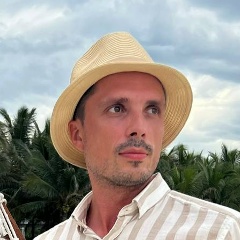Листаю какой-то местный журнал под названием Ubuntu (вы знали, что это зулусское слово?). Там есть статья про разработки южноафриканских ученых.
Например, некие Louis Liebenberg и Lindsay Steventon в 1996 году изобрели Cybertracker — Киберследопыт, навигатор, позволяющий отслеживать треки диких животных на местности. Отдельно отмечено, что интерфейс с картинками позволяет пользоваться программой тем, кто не умеет читать.
А дело было так, что этот Луис однажды познакомился с !Nati (не знаю, как передать по-русски, первый звук - щелкающий), охотником-аборигеном в пустыне Калахари. Наблюдая за ним на охоте, он оценил мастерство, с которым !Nati ориентировался в пустыне и феноменально чувствовал животных (в этих краях почти все коренное население — многовековые охотники). А !Nati просил помочь ему найти работу (предсказуемо, да). Он привык быть охотником-собирателем, но в современном мире это делать все труднее, а древнее искусство следопыта теряет свою актуальность. И в тот момент Луису подумал, что охотники хорошо бы вписались в экотуризм, могли бы помогать в заповедниках следить за животными и контролировать процессы их миграций. А заодно пришла идея создать и такой навигатор.
Не знаю, почему я это рассказываю — прочитала у него на сайте. На самом деле, мне понравилась эта картинка.
https://cybertrackerblog.files.wordpress.com/2014/01/cropped-rolex53j.jpg
Например, некие Louis Liebenberg и Lindsay Steventon в 1996 году изобрели Cybertracker — Киберследопыт, навигатор, позволяющий отслеживать треки диких животных на местности. Отдельно отмечено, что интерфейс с картинками позволяет пользоваться программой тем, кто не умеет читать.
А дело было так, что этот Луис однажды познакомился с !Nati (не знаю, как передать по-русски, первый звук - щелкающий), охотником-аборигеном в пустыне Калахари. Наблюдая за ним на охоте, он оценил мастерство, с которым !Nati ориентировался в пустыне и феноменально чувствовал животных (в этих краях почти все коренное население — многовековые охотники). А !Nati просил помочь ему найти работу (предсказуемо, да). Он привык быть охотником-собирателем, но в современном мире это делать все труднее, а древнее искусство следопыта теряет свою актуальность. И в тот момент Луису подумал, что охотники хорошо бы вписались в экотуризм, могли бы помогать в заповедниках следить за животными и контролировать процессы их миграций. А заодно пришла идея создать и такой навигатор.
Не знаю, почему я это рассказываю — прочитала у него на сайте. На самом деле, мне понравилась эта картинка.
https://cybertrackerblog.files.wordpress.com/2014/01/cropped-rolex53j.jpg
I leaf through some local magazine called Ubuntu (did you know that this is a Zulu word?). There is an article about the development of South African scientists.
For example, in 1996, Louis Liebenberg and Lindsay Steventon invented Cybertracker, a cyber-explorer, a navigator that allows you to track wild animal tracks on the ground. It is separately noted that the interface with pictures allows the program to be used by those who cannot read.
But it was like this that Louis once met Nati (I don’t know how to convey in Russian, the first sound is clicking), an Aboriginal hunter in the Kalahari Desert. Watching him on the hunt, he appreciated the skill with which! Nati was oriented in the desert and felt phenomenally animals (in these parts almost all indigenous people are centuries-old hunters). Ah! Nati asked to help him find a job (predictably, yes). He used to be a hunter-gatherer, but in the modern world it is becoming more difficult to do, and the ancient art of the tracker loses its relevance. And at that moment, Louis thought that the hunters would have been well integrated with ecotourism, could help in wildlife reserves to monitor animals and control the processes of their migrations. And at the same time the idea came to create such a navigator.
I do not know why I am telling this - I read it on his website. Actually, I liked this picture.
https://cybertrackerblog.files.wordpress.com/2014/01/cropped-rolex53j.jpg
For example, in 1996, Louis Liebenberg and Lindsay Steventon invented Cybertracker, a cyber-explorer, a navigator that allows you to track wild animal tracks on the ground. It is separately noted that the interface with pictures allows the program to be used by those who cannot read.
But it was like this that Louis once met Nati (I don’t know how to convey in Russian, the first sound is clicking), an Aboriginal hunter in the Kalahari Desert. Watching him on the hunt, he appreciated the skill with which! Nati was oriented in the desert and felt phenomenally animals (in these parts almost all indigenous people are centuries-old hunters). Ah! Nati asked to help him find a job (predictably, yes). He used to be a hunter-gatherer, but in the modern world it is becoming more difficult to do, and the ancient art of the tracker loses its relevance. And at that moment, Louis thought that the hunters would have been well integrated with ecotourism, could help in wildlife reserves to monitor animals and control the processes of their migrations. And at the same time the idea came to create such a navigator.
I do not know why I am telling this - I read it on his website. Actually, I liked this picture.
https://cybertrackerblog.files.wordpress.com/2014/01/cropped-rolex53j.jpg

У записи 16 лайков,
0 репостов.
0 репостов.
Эту запись оставил(а) на своей стене Полина Оскольская





































